








UNLEASHING THE POWER OF COLLABORATION ACROSS THE AUKUS ALLIANCE
MICROFACTORIES: COMPACT POWERHOUSES FOR DEFENCE AND SUSTAINABILITY
PIONEERING AUKUS PARTNERSHIP FOR BANANA SHIRE
BANANA SHIRE COUNCIL HOSTS AUKUS FORUM, HIGHLIGHTING NEW GROWTH & OPPORTUNITIES FOR LOCAL BUSINESS
THE SYDNEY NUCLEAR SUMMIT: PIONEERING AUSTRALIA’S FUTURE IN NUCLEAR INNOVATION
NUCLEAR SUBMARINES & A CULTURE OF EXCELLENCE
A STRATEGIC & TARGETED APPROACH TO INTERNATIONAL PARTNERSHIPS
THE AUKUS CYBERSECURITY TASKFORCE STRENGTHENING THE SUPPLY CHAIN:
COULD TAMWORTH BE AUSTRALIA’S GATEWAY TO THE FUTURE OF FREIGHT?
INCENTIVISING NATIONAL SECURITY VENTURE CAPITAL (VC) & PRIVATE EQUITY (PE)
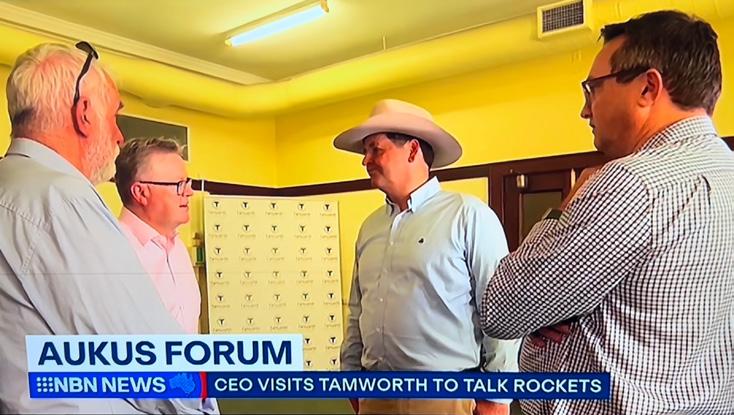

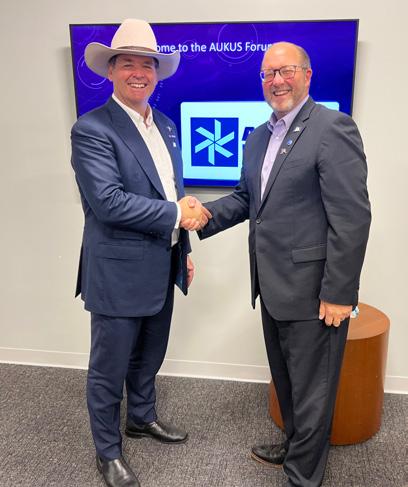
The AUKUS Forum Magazine offers your brand an exclusive opportunity to engage directly with industry leaders and decision-makers across the
Why Advertise with Us? The AUKUS Forum stands at the forefront of innovation and collaboration, making our publication the premier platform to:
Showcase your expertise to influential stakeholders driving the trilateral alliance.
Position your brand alongside cutting-edge advancements in defence, AI, cyber, and beyond.
Align with a publication that champions progress and partnerships under the AUKUS framework.
Receive Our Media Kit
Explore tailored advertising options that ensure maximum visibility and impact.
Request our media kit for detailed insights into audience reach, pricing & partnership opportunities.
At the AUKUS Forum, our mission to unite industry, academia, government, and defense continues to gain momentum, delivering results that demonstrate the vast potential of collaboration under the AUKUS partnership. By advancing infrastructure, innovation, and connectivity, we are shaping a future that bridges continents and industries.
Banana Shire Council: A Queensland Success Story
The “Unleash the Queensland Power of AUKUS” event, hosted by the Banana Shire Council, was a resounding success. Featuring insightful speakers and engaging factory site visits, the event underscored the vital role of Queensland’s manufacturing sector in advancing AUKUS-related opportunities. From advanced manufacturing to defense innovation, Queensland is positioned to lead in fostering national and global progress.
Sydney Nuclear Summit: A Milestone in Strategic Dialogue
The Sydney Nuclear Summit marked a pivotal moment in our mission to strengthen Australia’s nuclear capabilities. Attendees gained valuable insights into the future of nuclear technology and its potential for energy, defense, and industrial growth. The success of this summit reflects the AUKUS Forum’s commitment to driving innovation and workforce development in this critical sector.
to Capital: Unlocking Industry Growth
Through our collaboration with Industrial Base Capital Partners, we are opening doors to significant funding opportunities for industries across the AUKUS alliance. Access to capital is a cornerstone for enabling businesses to scale, innovate, and meet the growing demands of advanced defense technologies. This partnership ensures industries have the financial backing needed to succeed.
Rocket Cargo: Connecting Texas to Tamworth and Beyond Infrastructure and connectivity are essential to realizing the AUKUS vision. One groundbreaking initiative is Rocket Cargo, which will revolutionize global logistics by connecting key regions like Texas and Tamworth in record time. This transformative project highlights the AUKUS Forum’s role in driving advanced transportation solutions, providing faster and more efficient delivery systems for critical goods, and ensuring the supply chain of tomorrow meets the demands of today.
The AUKUS Connect Program continues to gain traction. I’ve been crisscrossing the United States to forge meaningful partnerships, and now with the launch of our Special Office for AUKUS initiative, we are deepening collaboration in states like Arkansas, Florida, Maryland, and Connecticut, leveraging the expertise of local industries to drive innovation and opportunity.

By Michael Sharpe, CEO, AUKUS Forum
Workshops and Think Tanks: Driving Thought Leadership
From workshops in Australia to the U.S., the AUKUS Forum is fostering knowledgesharing through keynote speakers who bring real-world experience and visionary insights. Complementing these efforts is the growth of our Think Tank, the Center for American Industrial Strength, which is expanding our engagement with governments, defense organizations, academia, and industries across the AUKUS nations.
Connecting with Our Community: Over 33,000 Strong
The AUKUS Forum’s influence continues to grow, now with a community of over 33,000 followers on LinkedIn and through our AUKUS Forum News publications. These platforms allow us to showcase success stories, share updates, and highlight what “good” looks like in industry collaboration and innovation.
Infrastructure as the Backbone of Collaboration
At the core of these initiatives lies the importance of infrastructure—bridging physical, digital, and logistical divides. Whether through rocket cargo systems or state-of-the-art manufacturing facilities, our efforts are building the framework for a connected, resilient future that advances national security and economic prosperity.
As we continue to expand our initiatives, I am filled with optimism about the future. The AUKUS Forum is a testament to the power of collaboration, innovation, and shared vision. Together, we are not just advancing industries; we are shaping a prosperous and more secure future for all.

MICROfactories redefine traditional manufacturing by compressing processes into small, modular systems capable of operating in diverse environments. These innovative facilities utilise locally sourced and recycled materials, aligning with sustainability goals while reducing reliance on global supply chains—a crucial factor in maintaining defence readiness. Their modularity allows for deployment near end-use locations, enabling rapid production and minimising logistical challenges.
In the context of AUKUS, MICROfactories offer decentralised production capabilities that complement distributed defence strategies. Embedding these facilities in bases or regional defence hubs can significantly enhance the ability to produce mission-critical components on demand, mitigating risks associated with supply chain disruptions during periods of geopolitical tension.
The success of MICROfactories hinges on advanced material science and engineering. Transforming waste into high-performance materials requires a deep understanding of material properties, innovative recycling techniques, and sophisticated processing methods.
Professor Veena Sahajwalla and her team at the UNSW SMaRT Centre are leaders in this field, pioneering technologies that convert waste into valuable industrial inputs.
One notable example is the Filament Microfactory, which processes plastics from discarded electronics (e-waste) to produce high-quality materials for additive manufacturing and other applications. These technologies illustrate how material science enables waste to become a critical resource, advancing both sustainability and industrial capability.
By Prof Veena Sahajwalla Professor of Materials Science in the Faculty of Science at UNSW Australia
The AUKUS partnership creates a unique opportunity to accelerate the commercialisation of transformative technologies through collaboration between research, defence, and industry. An example of this is the possibility of QPQ surface modification, developed at UNSW, which enhances the wear resistance and durability of steels using environmentally friendly methods. This innovation is particularly suited for defence applications such as naval and aerospace components, where materials must endure extreme operational conditions.
Scaling such technologies from lab to pilot requires coordinated efforts to overcome challenges related to infrastructure, regulatory compliance, and resource mobilisation. AUKUS can play a key role in establishing shared pilot facilities where these materials and processes can be tested under real-world conditions, ensuring they meet the operational standards of all partner nations. This approach not only accelerates technological maturity but also strengthens sovereign manufacturing capabilities.
Defence supply chains often rely on complex global networks, making them vulnerable to disruptions. MICROfactories address these challenges by enabling localised and decentralised manufacturing. By incorporating Microrecycling Science, developed at UNSW SMaRT Centre, they recover critical materials from waste streams and reintroduce them into production, reducing reliance on international supply chains and enhancing resilience.

Locally sourced waste materials are transformed into high-value outputs, creating a circular economy while supporting defence readiness. This capability allows MICROfactories to produce essential parts and materials near deployment sites, minimising logistical delays and ensuring that critical components are available when needed. For the Navy, this flexibility is invaluable in maintaining operational capabilities with minimal supply chain vulnerabilities.
MICROfactories extend their impact beyond defence by fostering “economies of purpose,” which align technological innovation with societal benefits. By localising production and employing advanced recycling techniques, MICROfactories not only meet defence requirements but also generate jobs,
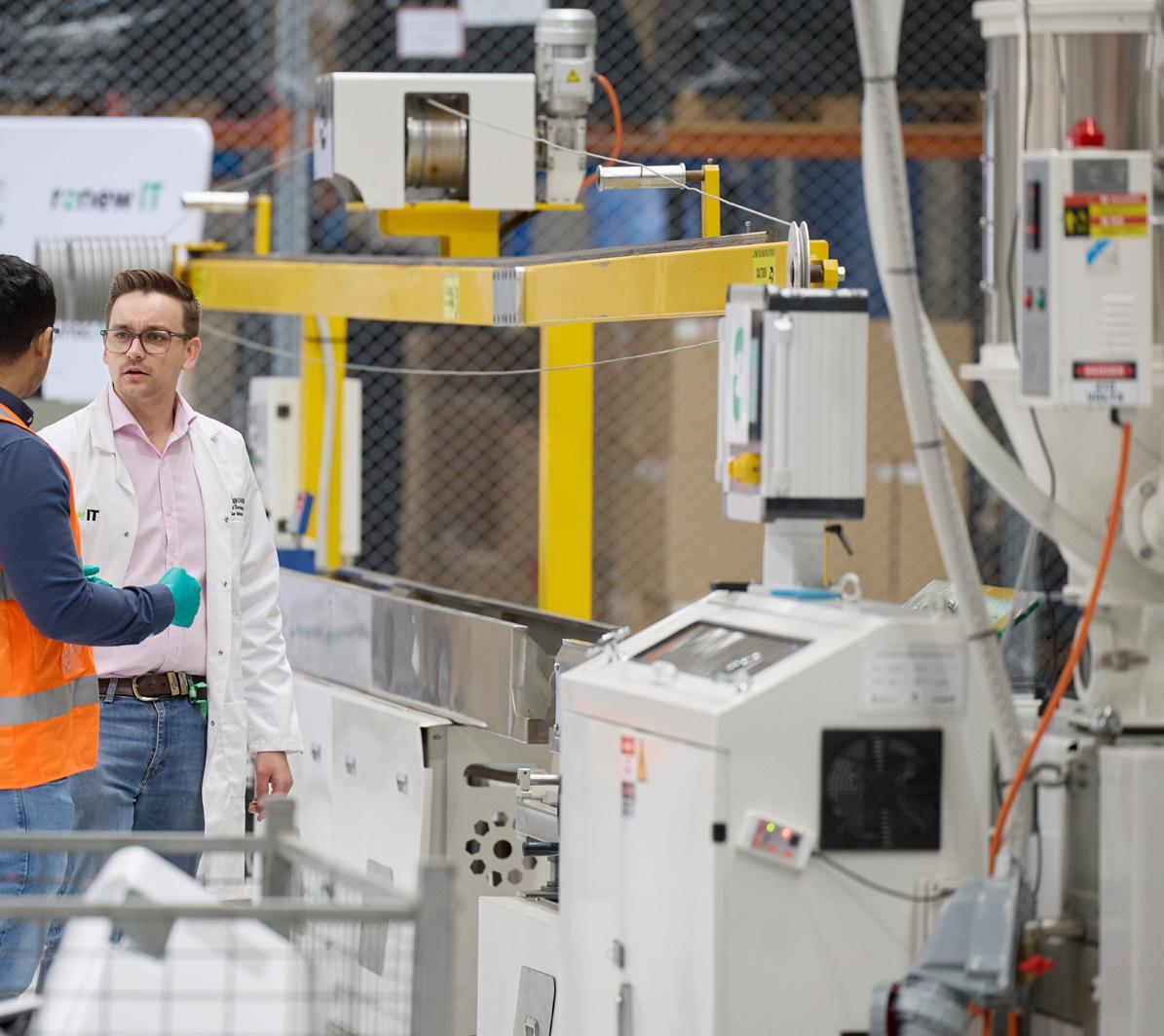
upskill workers, and build sustainable manufacturing ecosystems in the regions. The production of recycled materials, such as e-waste-derived 3D printing filament, demonstrates how MICROfactories bridge the needs of defence with broader community development goals.
Conclusion
Powered by cutting-edge material science and Microrecycling innovations, MICROfactories offer a sustainable, decentralised manufacturing solution that can strengthen defence supply chains, supports operational readiness, and benefits local communities. Their integration into defence strategies can improve resilience and sustainability while contributing to broader societal goals. To learn more, visit www.smart.unsw.edu.au.


Banana Shire Council Mayor Nev Ferrier has highlighted his Shire’s pioneering partnership with the AUKUS Forum during the recent Annual Local Government Association of Queensland Conference.
Mayor Ferrier told the conference that through this collaboration, industries within the LGA are gaining direct access to international networks and industry experts. This membership is designed to foster growth and innovation across local businesses, helping them expand their supply and manufacturing capabilities. “The core of our partnership is providing local industries—small, medium, and
large—direct access to expansive networks that foster job creation and business growth,” Mayor Ferrier said.
The partnership has already facilitated significant events, such as a three-day workshop where local manufacturers connected with defence experts and specialists in advanced manufacturing.
Additionally, a nuclear technology and sustainability workshop led by expert Jasmin Diab, educated local businesses on cutting-edge developments and opportunities for future growth. These events, alongside ongoing consultations, are preparing local industries for the future.
The Mayor said the two-year partnership, running until April 2026, is already showing results. “Key local industries such as the Queensland Nitrate Plant, Callide Manufacturing Company and First Grade Contract Maintenance have been selected to benefit from the Shire’s umbrella membership with the AUKUS Forum,” he said. “These businesses are being evaluated for their potential to contribute to the supply and manufacturing chains essential to defence and technological advancement.”
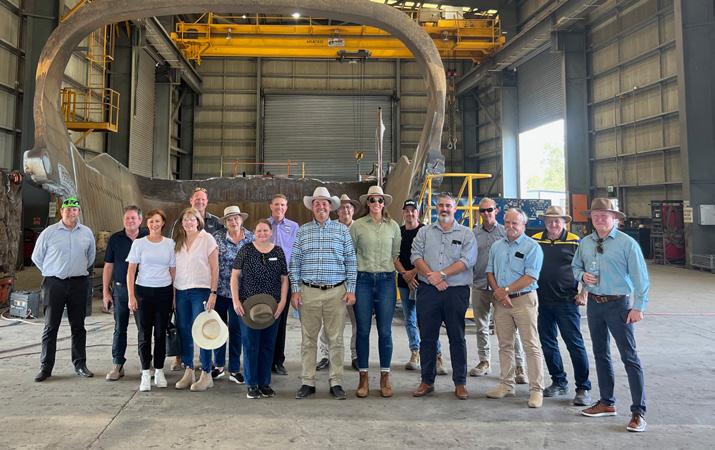

Banana Shire Council hosted the AUKUS Forum business event, bringing together industry leaders, local businesses, and government from across Central Queensland and the eastern states. The event leveraged the council’s unique position as the first and only local government member of the AUKUS Forum, a partnership that is set to continue until April 2026.
The forum featured distinguished speakers including Michael Sharpe from AUKUS Forum, who spoke on the future potential of regional manufacturing and the emerging guided weapons industry in Australia. CEO of Masters and Young, Rodney Young emphasised the crucial roles of business and highlighted the importance of suppliers. He also spoke about the importance of quality assurance and certifications required in the defence industry.
Local innovations were also showcased, with First Grade Contract Maintenance, Callide Manufacturing Company and Novum Energy taking centre stage. These companies are realising the positive benefits that come from finding solutions to recognised problems, demonstrating the growth of local industry beyond the borders of Banana Shire, a hub for advanced manufacturing and sustainable energy solutions. Lauren Collocott and Jade Plummer from Callide Manufacturing Company represented Banana Shire’s youth on the AUKUS Forum Youth Advisory Panel and shared their experiences with those in attendance to close out the event.
The AUKUS Forum held in Biloela highlighted Banana Shire Council’s commitment to economic growth and innovation. Mayor Nev Ferrier thanked the guest speakers: “Your expertise and insights are invaluable as we navigate this next chapter of growth. We’re excited about the new opportunities these connections are going to bring to our community.”
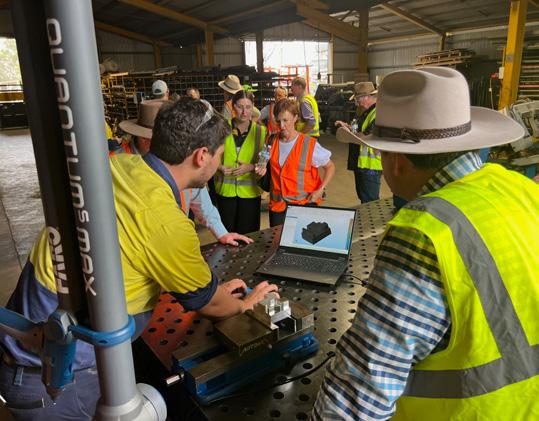
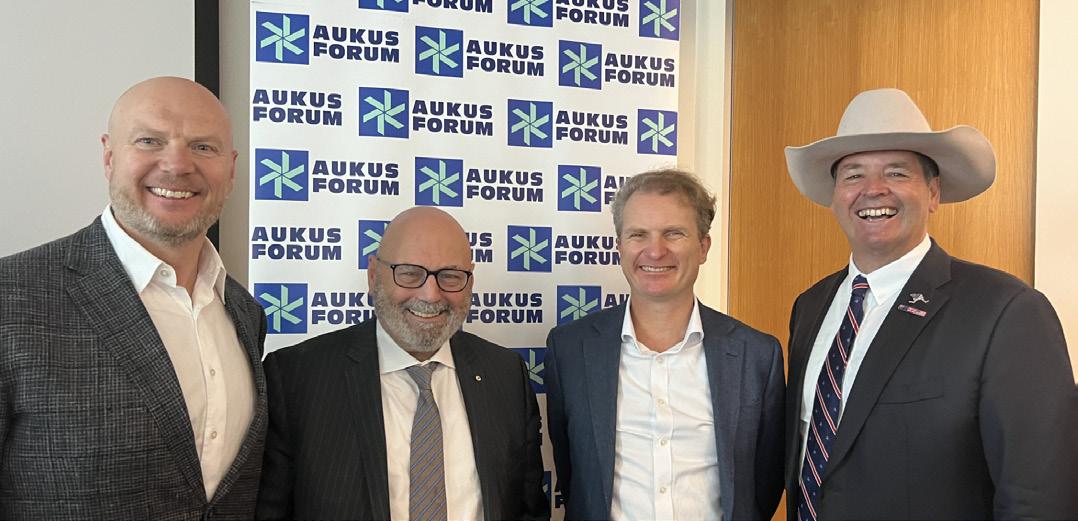
The Sydney Nuclear Summit, founded by Michael Sharpe and hosted by the AUKUS Forum in collaboration with the Nuclear Taskforce, marked a pivotal moment in shaping Australia’s nuclear future. Bringing together experts, policymakers, and industry leaders, the event set the stage for innovation, collaboration, and opportunities in the global nuclear landscape.
Sharpe opened the Summit with a compelling vision, emphasizing the AUKUS partnership as Australia’s largest industrial undertaking. “This is more than defence—it’s a whole-of-nation opportunity to drive innovation, create jobs, and build industries,” Sharpe stated.
A key highlight was the keynote by Professor Matthew Hole of the Australian National University, a global leader in fusion energy research. Professor Hole outlined the transformative potential of fusion energy as a sustainable power source and emphasized Australia’s role in global initiatives like ITER, the world’s largest fusion experiment. “Through initiatives like AUKUS and ITER, Australia can lead in nuclear innovation, aligning our expertise with global opportunities,” he remarked.
The Summit also featured Dale Heinken, a U.S. Navy veteran, who shared lessons
from the Naval Nuclear Program’s unparalleled safety and operational standards. His insights underscored the importance of discipline and excellence in nuclear operations as Australia embarks on its nuclear journey.
Former Defence Minister and Co-Chair of the AUKUS Forum Advisory Board, The Hon Joel Fitzgibbon, reinforced the need for a unified national effort. “Collaboration between government, industry, and academia is key to unlocking AUKUS’s full potential and integrating advanced technologies across our economy,” he said.
The event concluded with Co-Chair The Hon Arthur Sinodinos AO, who emphasized the AUKUS Forum’s role in bolstering Australia’s capabilities for industry growth.
The Sydney Nuclear Summit demonstrated the power of collaboration and vision, providing a roadmap for leveraging nuclear innovation to drive sustainable growth, energy security, and economic resilience. With its focus on strategic partnerships and cutting-edge research, the Summit positioned Australia as a rising leader in the global nuclear industry.
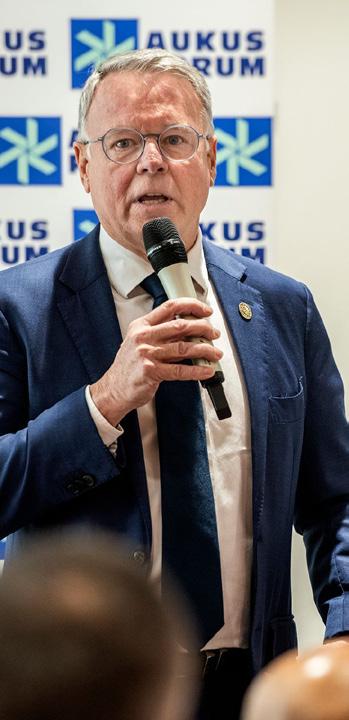
By Dale Heinken
As Peter Drucker stated, “Culture eats strategy for breakfast”, and a strong, positive culture can often have a greater impact on outcomes than technology or strategies employed. But what does culture have to do with the AUKUS agreement, a trilateral security pact between Australia, the United Kingdom, and the United States?
The purpose of the agreement is to enhance cooperation in defence and technology between the three nations. Pillar I is notably focused on the development of nuclear-powered submarines for Australia and Pillar II deepens cooperation in areas such as technology, cyber, artificial intelligence, quantum technologies, and additional capabilities to support defence and security. AUKUS will bring major changes to our local economy and job market, with the potential to employ thousands of Australians in new, exciting, and rewarding careers. It’s estimated that 20,000 new jobs will be required to build, service and maintain the submarine fleet. Many more will be created to support Pillar II. Again, what does this have to do with culture?
One of the intangible and perhaps unforeseen benefits of AUKUS— particularly Pillar 1’s acquisition of nuclearpowered, conventionally-armed Virginiaclass submarines—is the culture of excellence that underpins the historically unprecedented safety and reliability record of these impressive machines. Australian naval officers are attending Naval Nuclear Power School in the United States and others are serving aboard U.S. submarines as part of an exchange program. A generation of uniformed and civilian Defence personnel are being introduced to the U.S. Naval Nuclear Propulsion Program’s culture of excellence. This creates an opportunity for Defence to leverage these experiences to embark on a generational shift in Defence culture as this group grows.
Why is the U.S. Naval Nuclear Propulsion Program considered to have a “culture of excellence”? Because of its focus on high standards, uncompromising adherence to safety, and proactive drive
for continuous improvement. Since its inception in the 1950s, it has never had a reactor accident or release of radioactivity with an adverse effect on human health or the environment. The Program’s standard and record surpass those of any other military or civilian nuclear program. The Program’s injury and illness incidence rates and lost workdays are about onethird of the rates for general industry. The Program is studied extensively for its ability to achieve excellence and served as the basis for high reliability organisation theory. It has been referenced in books such as High-Velocity Edge: How Market Leaders Leverage Operational Excellence to Beat the Competition by Stephen J. Spear and countless others. When other industrial programs encounter crisis, they turn to the Program and former personnel for guidance such as Admiral Rickover’s support in getting three astronauts safely home after a critical failure on the Apollo 13 spacecraft to Admiral Donald leading an investigation into Boeing’s recent quality control issues. Both were former heads of the Program.
What makes the U.S. Naval Nuclear Propulsion Program a benchmark for a culture of excellence? Technology is one reason. Because of the potential impact to human health and the environment due to a failure, the Program has a focus on conservatism in design and operation. It spent nearly a decade evaluating the incorporation of digital instrumentation to replace analog instruments into reactor controls. It was not because of paralysis by analysis but a mandate to verify that changes to the technology would not compromise safety.
Additionally, the Program invests heavily in its people. The Program starts by selecting high-performing individuals and then puts them through a one year long Naval Nuclear Power School, considered the most academically rigorous U.S. military program. But the training does not stop there. Throughout their careers, these nuclear-trained individuals undergo continuous training and testing on theory, systems, and casualty procedures to maintain a high level of knowledge and proficiency.

In operations, every individual has a voice, and they are encouraged to ask questions. They are expected to contribute to the success of the organisation from day one, and senior management has the responsibility to engage front line operators. This is driven by the fact that senior management is ultimately accountable for the safety culture of the organisation. In severe instances, this can mean their removal from a leadership position.
While there are other tenets of the Program’s culture of excellence, one of the most significant is the emphasis on continuous improvement. Organisations within and supporting the Program are evaluated on their ability to identify issues and trends, determine root causes, and correct them. The Program even takes the extra step of sharing issues among other organisations in the enterprise for them to learn from the mistakes of others. It is the strong emphasis on high standards in equipment and people and continuous improvement that has driven the U.S. Naval Nuclear Program in achieving excellence.
Defence is already being exposed to this culture of excellence, and it will be a matter of time before it is institutionalised. But this culture of excellence shouldn’t be limited to defence. Any organisation looking to enhance operational excellence can benefit from learning the U.S. Naval Nuclear Propulsion Program’s tenets and incorporating them. Irrespective of your support for nuclear power, there is ample evidence that the culture of excellence demonstrated by the U.S. Naval Nuclear Propulsion Program enhances the safety and efficiency of organisations that embrace it.
Dale Heinken served for 26 years in the U.S. Navy as a nuclear-trained surface warfare officer. He had command of USS BOXER (LHD 4), served as the Reactor Officer aboard USS THEODORE ROOSEVELT (CVN 71) and was on the naval nuclear propulsion examination team. Dale also serves as an advisor to the AUKUS Forum nuclear taskforce.
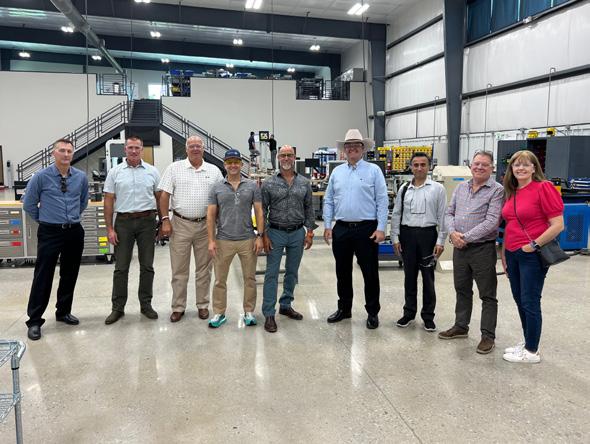
This month, the AUKUS Forum highlights the State of Arkansas and its role in advancing the AUKUS partnership. We are supporting Australian and UK organisations to expand into the United States. Through the Special Office for AUKUS initiative and AUKUS Connect program, we’re forging new alliances that drive innovation and create opportunities across Australia, the U.S., and beyond. Arkansas exemplifies “More Than Submarines” with its robust manufacturing base, cutting-edge research, and highly skilled workforce. It demonstrates how AUKUS Pillar Two—focused on artificial intelligence, advanced cyber, and more— is unlocking potential across industries.
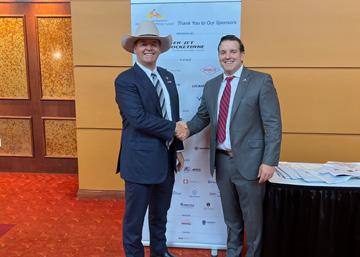
PARTNER, SPONSOR, COLLABORATE WITH US: AUKUS Forum Global Partnerships Manager, Matthew Netherwood matthew@aukusforum.com
“GROW
SPECIAL OFFICE FOR AUKUS AND AUKUS CONNECT
The Special Office for AUKUS connects business across nations, with hubs in:
Rogers, Arkansas: Aerospace and advanced manufacturing.
Kennedy Space Center, Florida: Space manufacturing.
Maryland Technology Center: Defense and innovation.
Groton, Connecticut: Submarine sector expertise.
THROUGH AUKUS CONNECT, ARKANSAS COMPANIES CAN COLLABORATE WITH GLOBAL PARTNERS, OPENING DOORS TO NEW MARKETS AND ADVANCING AUKUS PRIORITIES.
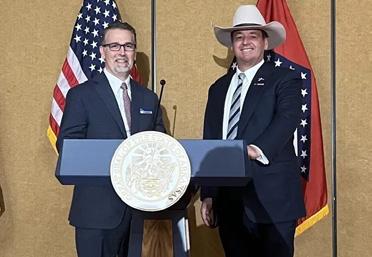
ARKANSAS: A HUB OF INNOVATION
Caterpillar, North Little Rock: Over 15,000 machines produced, showcasing precision manufacturing.
Mundo-Tech, Rogers: Leaders in fabricated tube assemblies for aerospace and defense.
Workforce Excellence: The Arkansas Aerospace and Defense Alliance supports local and industry across the State.
Supply Chain Resilience: The World Trade Center Arkansas and the University of Arkansas are key organizations.
Arkansas’ capabilities exemplify AUKUS’ collaborative spirit. By connecting innovators and strengthening supply chains, the Special Office for AUKUS is building a secure and prosperous future for all alliance nations.
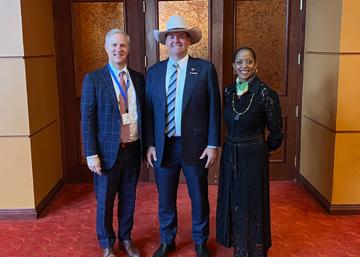


The State of Connecticut, America’s 48th largest state, is home to an amazing economic development and growth environment. Connecticut is #1 in the US in aircraft engine and parts manufacturing and #2 in the US in shipbuilding. Groton is the home of General Dynamics Electric Boat and is the Submarine Capital of the World!
Connecticut is fiscally sound, with stable tax rates and Governor Ned Lamont recently enacted the largest tax cut in state history. We have a robust workforce development system, and we are the only state in the US to have a Chief Manufacturing Officer to lead the growth and support of the manufacturing industry.
The AUKUS partnership—a trilateral security pact among Australia, the United Kingdom, and the United States— continues to mark significant milestones in fostering military and technological collaboration. Central to this collaboration is the role of the U.S. state of Connecticut, a hub of advanced manufacturing and defense innovation. Recent developments in Connecticut highlight how local industries and communities contribute to this strategic alliance.
Connecticut has emerged as a vital player in the AUKUS pact, primarily due to its established reputation as a defense and manufacturing leader. Home
to renowned companies like General Dynamics Electric Boat and Pratt & Whitney, the state has been pivotal in the design and construction of nuclearpowered submarines for decades. This expertise aligns seamlessly with AUKUS’s objectives. As AUKUS accelerates submarine production, Electric Boat is experiencing increased demand, creating jobs and driving innovation within the state.
The AUKUS collaboration has brought significant economic benefits to Connecticut. The state’s shipyards and associated industries are ramping up operations to meet the demands of both domestic naval projects and international commitments under AUKUS. This has translated into expanded workforce opportunities. Electric Boat, for instance, has launched aggressive hiring campaigns, aiming to add thousands of skilled workers to their ranks over the next few years.
Additionally, the partnership has spurred investment in training and education. Local institutions, such as the University of Connecticut and technical colleges, are aligning their programs to equip students with the specialized skills required for advanced manufacturing and defense roles. This symbiosis between academia and industry ensures a steady pipeline
of talent to support AUKUS and broader defense needs.
Connecticut’s contributions to AUKUS exemplify how local initiatives can strengthen global alliances. By leveraging its expertise in submarine technology and advanced manufacturing, the state is playing a crucial role in fostering security across the Indo-Pacific.
As AUKUS evolves, Connecticut’s role is expected to grow, further solidifying its position as a cornerstone of U.S. defense infrastructure. The collaboration not only enhances national and allied security but also creates a ripple effect of economic growth and innovation. Through partnerships like AUKUS, the U.S. and its allies demonstrate a shared commitment to stability, technological progress, and the safeguarding of democratic values worldwide.
By anchoring its contributions in Connecticut, the United States reinforces the importance of local expertise in addressing global imperatives, ensuring that both security and prosperity are shared among nations.
By PAUL S. LAVOIE Chief Manufacturing Officer Office of Manufacturing State of Connecticut


#1 STATE for aircraft engine and engine parts manufacturing (AdvanceCT, 2024)

#2 STATE for federal defense contract dollars received per capita (Department of Defense, 2022)



In a time of rapid growth and technological advancements in the space industry, we must take proactive steps to strengthen international relations that foster innovation and expand aerospace capabilities globally. Using a targeted approach, Space Florida works with international entities like AUKUS to identify opportunities for companies that will drive forward the aerospace and space transportation sectors.
As the independent aerospace finance and development authority for Florida, Space Florida is uniquely positioned to connect and support international trade and development opportunities for the global space industry. Florida’s strategic assets— like our statewide spaceport territory with Cape Canaveral as the critical node in the system—offer an unbeatable environment equipped for advancing creative space transportation and secure international operations. These assets not only support our state and national goals but are crucial in strengthening alliances that prioritize defense, security, and resilience in space.
By working with our allies in Australia and the United Kingdom — and others as international interest in Florida has rapidly increased recently— Space Florida aims to create a global space transportation network, fueled by private industry, that enhances commercial opportunities, fosters secure communication channels, and opens new avenues for technology development. With our unmatched financial tools that leverage private capital and prioritize infrastructure development, we can advance international cooperation to boost aerospace trade.
Much like the transportation networks that support airports and link international travel and commerce, a network of spaceports—connected and supported through global cooperation—could redefine the boundaries of economic
By Rob Long, President & CEO, Space Florida
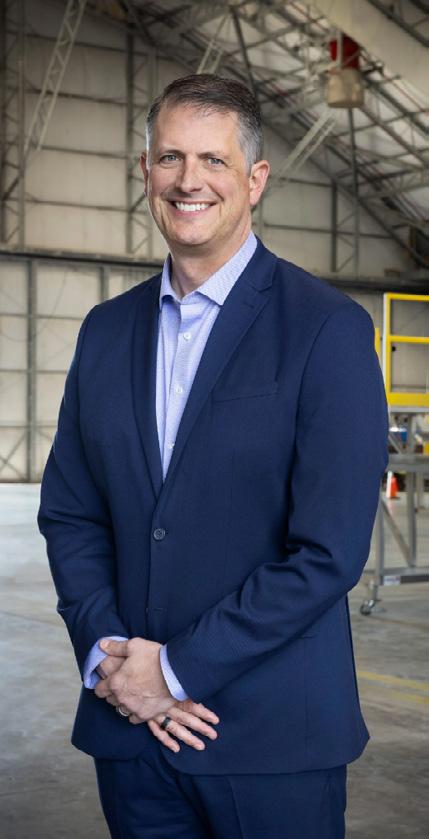
exchange. Innovative commercial concepts like space trade routes enabled by point-to-point space travel require international cooperation and development. Strategic considerations for establishing space commerce trade routes are needed to ultimately build an international aerospace commerce framework to support industry growth, encourage private investment, and ensure sustainable development.
The recent expansion of Florida’s spaceport system territory to include areas in South and Northwest Florida opens up more opportunities for international partners to access premier facilities across a state with an environment that is optimized for business and access to a talented workforce fueled by our top university system. We are also working on federal changes to make spaceports bonds tax exempt, to increase more private investment into Florida’s space transportation infrastructure. This expansion and proposed changes can create opportunities for AUKUS nations seeking reliable access to
modern operations sites outside of their own territories, and enable a shared commitment to space resilience, defense innovation, and international trade expansion.
As AUKUS focuses on safeguarding and advancing the space industry, Space Florida remains dedicated to driving growth through meaningful, international relationships. By building partnerships strategically, Space Florida aims to strengthen national security, open new doors for trade, innovation, and development within the aerospace industry.
Our strategic approach to international partnerships creates a cooperative aerospace network that will serve as a model for sustainable, secure, and innovative space operations in the years to come. Through targeted collaboration and a commitment to resilience, we can shape the future of the international space economy, ensuring that Florida and our partners remain at the forefront of space exploration and commerce.


























The consensus among the populations of AUKUS constituent nations is that the immediate and long-term impacts of the AUKUS pact hinge largely on the isolated element of nuclear submarines. While the submarines as a final product are expected to remain a central focus of the agreement in the long run, within the next decade, AUKUS will also bring about greater regional security as well as a multitude of additional emerging opportunities.
The AUKUS pact presents significant opportunities across high-skilled sectors, bringing an influx of jobs and innovation across IT, manufacturing, engineering, and nuclear science. The complex process of building, maintaining, and advancing nuclear submarines requires skilled labor, thus creating thousands of specialised jobs across these fields. These jobs will not only benefit local economies but also raise the overall skill level within these countries, advancing industries that will be critical to the future economy. For example, as cyber technology and artificial intelligence become increasingly central to defense capabilities, the need for experts in these fields will only intensify. This demand is expected to lead to expanded training programs, apprenticeships, and employment opportunities, building expertise that will enhance the entire workforce.
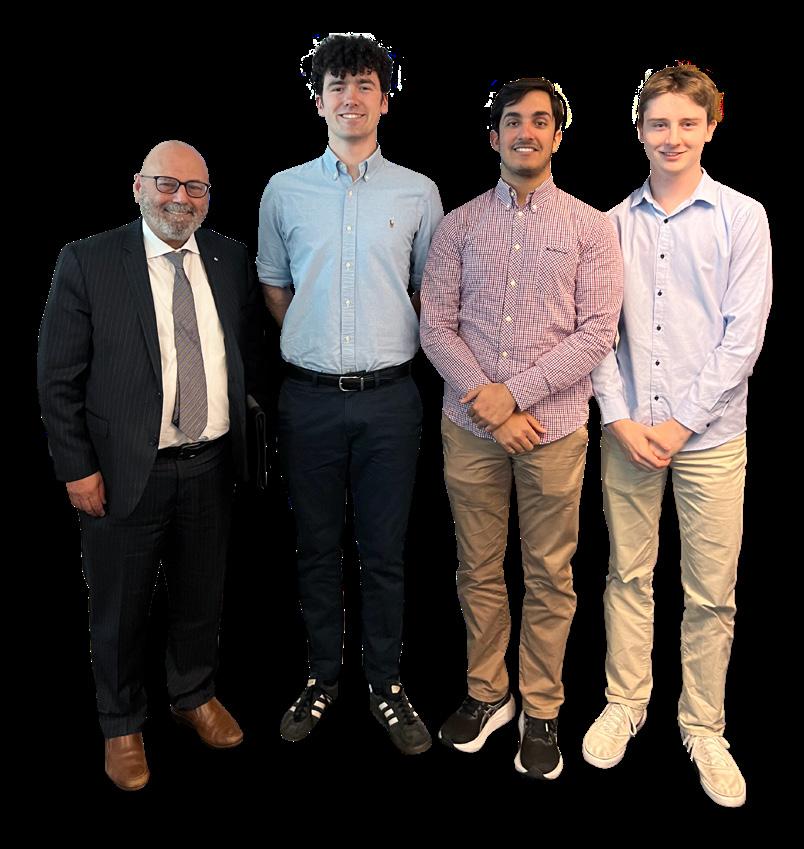
Moreover, the academic sector stands to benefit substantially. Universities and research institutions are likely to receive increased funding and opportunities for collaboration in fields such as nuclear physics, cybersecurity, and AI. These partnerships will strengthen the bond between government and academia, resulting in the development of new technologies and methodologies that support both defense and civilian applications. The expected influx of research projects and innovation hubs, driven by the AUKUS framework, could position AUKUS nations as leaders in advanced scientific research, fueling discoveries that extend far beyond military needs.
Another major impact of AUKUS will be its role in enhancing diplomatic and strategic ties with allies beyond the three primary nations. By strengthening their defensive capabilities and increasing their regional influence, AUKUS members are positioned to build stronger relationships with other nations in the Indo-Pacific and beyond. The enhanced standing of AUKUS countries in the global arena could lead to new partnerships and more robust security initiatives, creating a collaborative network of allied nations focused on peace and stability. This network would have access to shared intelligence resources and enable a deeper sense of regional cohesion.
In addition to promoting peace through strength, AUKUS is likely to promote economic growth by encouraging technological innovation, which will have ripple effects across many sectors. As these countries develop advanced technologies under the
AUKUS framework, they can share these advancements with allied nations and establish economic partnerships focused on sustainable development, technology, and security. This approach will not only deepen ties with regional allies but also create opportunities to lead in the global tech sector, capitalising on the growing need for cybersecurity and digital infrastructure.
In conclusion, while nuclear submarines will remain a defining feature of the AUKUS pact, the broader impacts over the next decade promise to be far-reaching. The pact will enable job creation, academic advancements, and deeper diplomatic ties. By drawing on the collective strengths of AUKUS nations and their allies, this agreement has the potential to drive progress in defense, technology, and diplomacy, offering longterm benefits that reach well beyond its immediate goals.
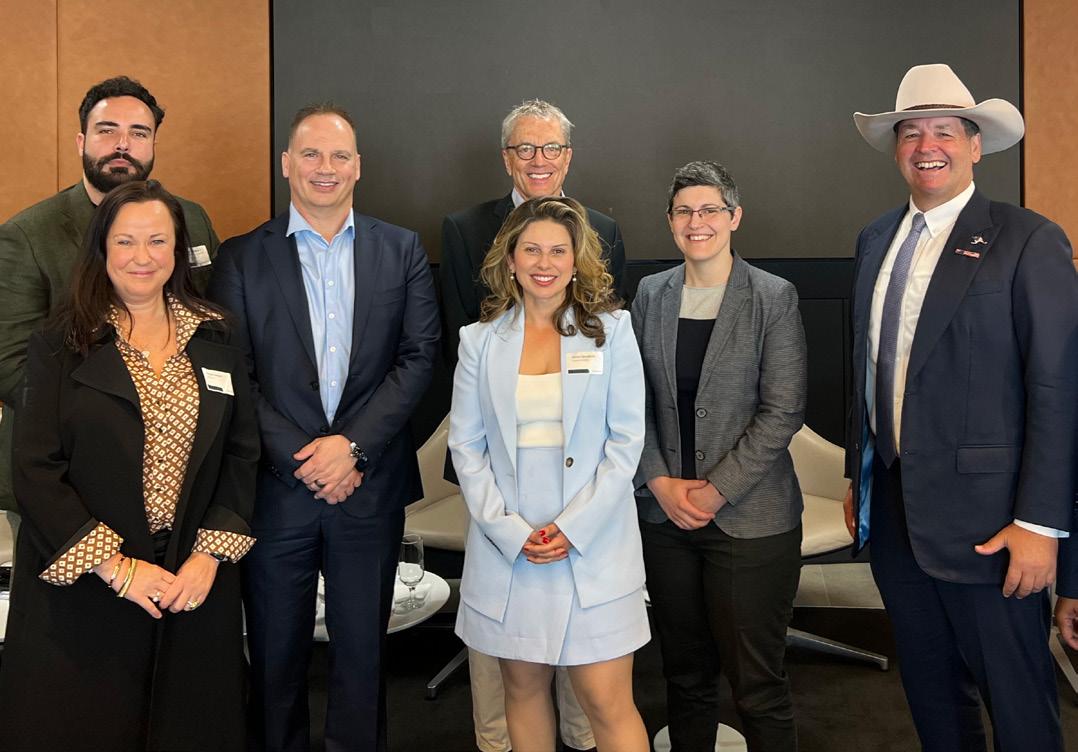
AUKUS FORUM CYBERSECURITY TASKFORCE – UPDATE
The defense industrial sector’s resilience is critical to the security of Australia, the United Kingdom, and the United States. As global supply chains become increasingly complex, cyber vulnerabilities in small and medium-sized enterprises (SMEs) that form the backbone of the sector can pose significant risks. To address this, the AUKUS Cybersecurity
Taskforce, chaired by Jacqui Nelson, will run a series of workshops and events in 2025 with some of Australia’s leading cybersecurity professionals. We will unveil a comprehensive framework to inform, educate, and empower SMEs to reduce supply chain risk.
A collaborative approach across industries is absolutely essential if we are to protect our nations critical infrastructure assets and ensure that we are able to collaborate in a way that guarantees the security of our most sensitive data. Cyber criminals are highly organised and have 2 main drivers: either to extort us for financial gain or to destroy our systems and data that in turn, will cause significant harm. Hackers have access to sophisticated tools that are
inexpensive to acquire, and AI is allowing them to automate attacks at a speed that is increasingly difficult to defend against. There is no silver bullet in today’s environment, so the need for SME’s and our larger institutions to understand where the risk lies and to architect ways to combat those risks has never been more important.
We look forward to inviting you to join our workshops and events throughout 2025.
Jacqui Nelson is the CEO at DekkoSecure and AUKUS Forum’s Advanced Cyber Committee Chair.
On Monday, 11 November 2024, Michael Sharpe, CEO of the AUKUS Forum, visited Tamworth to discuss the game-changing Rocket Cargo initiative, an innovative logistics concept that has captured the imagination of industry leaders.
“Rocket Cargo represents a paradigm shift in logistics,” Sharpe remarked Imagine receiving a package not weeks after ordering it, but within an hour of its launch. This is the bold vision former Tamworth Business Chamber President Matthew Sweeney and the AUKUS Forum are championing as they explore the potential for Rocket Cargo to reshape global logistics.
The concept, developed by SpaceX, involves launching rockets capable of carrying 150 tonnes of freight — comparable to a Qantas cargo flight





— and landing them across the globe in record time. With SpaceX perfecting reusable rocket technology, the company is now exploring the feasibility of commercializing this innovation for international shipping.
“The idea is to load up in Texas, where SpaceX is based, and within an hour, land in Australia,” said Mr. Sweeney. The discussion around Tamworth’s potential as a landing site was initiated during a recent AUKUS Forum meeting in the United States.
Michael Sharpe highlighted Tamworth’s unique advantages, including its clear airspace, reliable weather, and access to rail freight via the intermodal hub. “Tamworth is ideally positioned to become a pivotal player in this innovative development, enhancing our national infrastructure and amplifying our defence capabilities,” Sharpe noted.
While Rocket Cargo is still in its conceptual stage, with regulatory hurdles to overcome, efforts are already underway. Mr Sweeney has played an integral part in setting up venture capital fund Industrial Base Capital Partners,
• Antiterrorism/Force Protection
• Artificial Intelligence
• Building Hardening
• Digital Engineering
• Expert Consulting
• Explosive & Weapons Effects
• Facility Risk Assessments
• Human Performance Integration
• Modeling & Simulation
• Modernization & Upgrades
• Physical Design & Testing
• Radiation Sensing & Testing
• Rapid Prototyping & Manufacturing
• Software Development
• Systems Engineering
• VR Training Solutions
• UAV & UGV Full-Scope Capabilities


a corporate advisory and investment firm that's working with AUKUS Forum to support tech and manufacturing businesses, particularly ones in regional areas that may be overlooked.
“People might ask why Tamworth. My answer is, why not?” Sweeney said. “If we’re wanting to make AUKUS a nationbuilding program, we need to be starting from the ground up.”
As work continues, Tamworth’s future as a hub for next-generation logistics looks bright, setting the stage for Australia to lead in advanced freight technology.
Rocket Cargo News


In recent AUKUS publications and forums there has been a suggestion that AUKUS Governments should consider establishing a public-private innovation fund to finance AUKUS Pillar 2 capabilities.
While this suggestion seems reasonable at first glance, this article explores whether private investment in global national defence and security should remain independent of government. And if not, would a hybrid collaborative direct investment approach with defence focused VC and PE firms be more effective for AUKUS Pillar 2 success?
To set the global context, over the past three decades, geopolitics has been deflationary, created lower risk and made it easier for investors to invest in commercial markets. Going forward this is the complete opposite. We are looking at a market that is inflationary where there is more perceived investment risk not less.
Consequently, it is going to make it harder for traditional fund investors to direct their capital into areas that do not offer clearly recognised returns. Defence is one such market. It’s hard to penetrate, requires extensive capital investment and the timelines for returns on those investments are often long.
Interestingly, investors are used to dealing with pockets of instability and conflict, but many say the sheer number of recent shocks within traditionally stable democracies and the long-term nature of conflict represent a sea change in their ability to manage risk.
So, what’s changed? And why is defence now the focus of investment attention?
Well, since Russia invaded Ukraine in 2022, venture capital firms and generalist investors have been eagerly eyeing how well emerging and disruptive technologies have been exploited by Ukraine and to what extent this will encourage the wider procurement of technologies that would bolster Europe’s defence capabilities?
It is fair to say that after two years of warfighting there is still some confusion. Many are skeptical as to the actual
customer demand signal, whether the investment return is worth the risk, and how best to draw the line between investment in deep-tech versus defencetech.
Many large investment firms and investors remain challenged that by direct investment in defence focused capabilities due to Environmental, Sustainability or Governance (ESG) reasons? To allay these fears, we would ask government customers to re-iterate that there can be no ESG without defence or security. Outside of Europe the USA is on a more easily defined path. It is articulating and funding innovative defence capabilities at pace. Venture Capital funded startups like Anduril and Palantir have managed to break down legacy barriers and as a result, new technologies are now creating battle winning advantage.
It is with this in mind that AUKUS as an entity, and more specifically Pillar 2, has a role to play. We would propose that AUKUS should not only be known for its nuclear deterrent capability in Pillar 1, but more importantly as the “enabling programme for defence technology innovation” in Pillar 2.
Here, it provides an industrial agreement between longstanding allies. Has a clear alignment of defence strategic vision and is far more innovative than it would first appear.
Its purpose is to "enhance joint capabilities and interoperability," covering cyber capabilities, artificial intelligence, quantum technologies, and additional undersea capabilities. This year alone four more focus areas were added. Hypersonic and counter-hypersonic capabilities, Electronic Warfare, Innovation, and Information Sharing.
Whilst these are advanced capabilities that will be 'game-changing'. Defining the mission outcome or end state on how these will be used effectively needs customer involvement from the outset. Within AUKUS mission partners this approach is challenging where legacy procurement models often hinder the
agile exploitation of emerging and disruptive technologies until they are well understood.
So, what needs to be done? There are some encouraging signals. All three AUKUS governments recognise that solely relying on government funding will not be sufficient and that venture capital and private equity investment will be required to de-risk the early deployment of advanced technologies at enterprise scale.
Controversially, whilst the concept of private capital complementing public funds holds merit a recent article by the United States Studies Centre at the University of Sydney proposes the establishment of a "multi-sovereign public-private innovation fund to finance the development of AUKUS' Pillar 2" to tackle this.
Here the author draws comparisons with the NATO Innovation Fund (NIF) and its "alignment and collaboration with NATO's Defence Innovation Accelerator for the North Atlantic (DIANA).” It proposes the creation of a public-private innovation fund across the three AUKUS nations where it is argued, that by combining resources and expertise, the AUKUS nations can achieve technological breakthroughs that would be difficult to accomplish individually. This collaboration it argues would not only involve government entities but private sector partners, academic institutions and research establishments.
But would this work? Historically, both USA and UK Governments have made considerable investments in innovation organisations and agencies such as InQ-Tel, the National Security Innovation Network, the Defence Innovation Units, AFWERX, Naval X, DASA, Army Futures Command to tackle innovation exploitation. Whilst many have been successful the challenge, they face is not in identifying key battle winning technologies but assuring the commercial viability of these technologies through life. This is where venture capital has a role to play. It can, where required, assure the funding viability of startups from seed to growth stages of a startup lifecycle.


Without up-front venture capital or private equity funding many startups are simply unable to scale to deployed to military programs through what is colloquially referred to as the “valley of death”.
Why is this important? Well, if we are to maintain competitive advantage over our adversaries we need to accelerate technology exploitation to warfighters. By way of example, China's unprecedented investments across various technological areas potentially poses a serious threat to stability in key regions. A study by the Australian Strategic Policy Institute in 2023 highlighted that “China's global lead extends to 37 out of 44 emerging technologies, spanning defence, space, robotics, energy, biotechnology, artificial intelligence, advanced materials, and key quantum technology areas.”
Another report by the Center for Strategic and International Studies emphasises that China's defence industrial base is operating on a wartime footing and acquiring high-end weapons systems and equipment five to six times faster than the United States. Similarly, despite initial setbacks, Russia continues to heavily invest in its defence industrial base, avoiding international sanctions.
So, whilst funding announcements for AUKUS Pillar 2 remain opaque, there is an acknowledgment within the fledgling AUKUS Defence Investor Network (DIN) that government investment alone will not deliver these capabilities without a clear plan or strategy to incentivise the deployment of private capital.
We ought to consider how Defence and National Security AUKUS Pillar 2 working groups can work directly with approved venture capital firms to not only identify key technologies that are required but incentivising these firms to invest and accelerate innovation exploitation to mission customers.
The current proposal of provisioning a ‘Sovereign Fund’ would more than likely entail extensive due diligence, government regulation, compliance and managerial oversight for the deployment of public
expenditure. This would inevitably lead to delay and introduce a considerable amount of financial risk.
Alternatively, deploying public capital to supplement VC and PE investment would require public oversight, but it is logical to delegate responsibility for this kind of investment to third parties, much like the outsourcing of public funded pensions to private firms.
For AUKUS customers the collective use of the AUKUS Defence Investor Network (DIN) offers a hybrid approach that would encourage private investment and leverage a network of over 300 private capital investors to mobilise capital. Having a focused and approved AUKUS Pillar 2 engagement strategy where private capital investment aligns with the economic and national security interests of member nations would be beneficial for all.
One AUKUS DIN venture capital and private equity firm BOKA Group has already shown how being deeply integrated with all three AUKUS partners can deliver success. BOKA Group CEO John James recently said:
“In an era where technological advancements are rapidly transforming the battlefield, a quiet revolution is taking place. Private companies, once seen only as suppliers, and their funders are now at the forefront of defence innovation, crafting solutions that are reshaping global security.”
It is our opinion that the adoption of a collaborative approach to mobilising capital with venture capital and private equity offers merit and warrants further consideration. By re-envisioning the use of national institutions, incentivising defence venture capital firms appropriately and working to remove cross nation procurement barriers then Pillar 2 capability delivery to the warfighter will have a far greater chance of success.
This article was co-authored by Rory Copinger-Symes CBE and
Grant Hume
Rory has unique and extensive operational planning skills gained during more than 37 years service in the Royal Marines where he attained the rank of Brigadier and visited all corners of the globe. Rory’s most recent and final military appointment was in Hawaii on exchange with the U.S. Military. Between August 2016 and September 2020 Rory served on the staff of Indo-Pacific Command where he became the first British officer to assume the position leading on Security Cooperation. His previous role was as Chief of Staff to the Commandant General Royal Marines at the sametime as COS to Operation ATALANTA, the European Union’s counter piracy effort for Somalia. Prior to that he was based in Lisbon, Portugal for 3 years working on a NATO staff. His operational experience includes Northern Ireland, Sierra Leone, Iraq and Afghanistan. Since leaving the military in 2021 Rory has also expanded his horizons by launching a new whisky as well as working for a venture capital firm. Grant is an accomplished, highly experienced senior executive with over 30 years of experience in venture capital, corporate multinational IT organisations and the UK Ministry of Defence. Specialising in identifying innovative emerging and disruptive technologies to UK AUKUS defence and national security customers he is currently an Operating Partner at BOKA Group LLP, a global US incorporated Venture Capital & Private Equity firm. Previous roles include a CEO/Founder of a cloud IT services company and Principal Business Development Manager roles at Amazon Web Services for EMEA National Security & Defence Venture Capital and Startups, and UK National Security & Defence businesses. Grant is a former Lieutenant Colonel in the British Army, a Fellow of the British Computer Society, a Chartered IT Professional, and is an advisor to the National Cyber Security Centre (NCSC) Industry 100.
Delivering unparalleled capabilities in Design, Research, Manufacturing, and Testing.
Based in Brisbane, the company has established a strong reputation for quality and innovation, setting it apart in a competitive landscape. Its commitment to excellence is underscored by ISO certifications: ISO 9001:2015 and AS9100D, which assure clients of the organisation’s dedication to maintaining the highest standards in every aspect of its operations.
The collaborative efforts with industry giants such as Boeing, Rheinmetall, Thales, and EM Solutions highlight the trust and confidence these leaders place in Masters & Young’s ability to provide advanced PCB’s electronic components and completed printed circuit boards (PCBs). This ongoing support not only enhances the company’s credibility but also reinforces its position as a key player in the electronics sector.
Leadership and Industry Engagement
Rodney Young, the Owner and Managing Director, has been a prominent figure within the AUKUS Forum, having been invited as a special guest at numerous events across Australia, including those in Orange,
Tasmania, and most recently in Central Queensland, where he served as a keynote speaker. His insights into maintaining industry standards have reached international giants the likes of Bell following a recent invitation to visit Bell’s facilities in the USA, which significantly contribute to placing Masters & Young on the map as a trusted provider in the defence and high-tech sectors locally and abroad.
At Masters & Young, pride is taken in their Define, Design, Deliver methodology that ensures that they not only meet but exceed client expectations. The multidisciplinary R&D team continually explores the latest advancements in technology to drive innovation across various applications including aerospace, defense, medical, and industrial sectors. This approach enables the company to provide tailored solutions that are both efficient and effective.
In addition to its stronghold in defence electronics, Masters & Young is actively expanding its client base within the Medical, Industrial, and Mining sectors. The commitment to working closely with local and national governments further demonstrates its dedication to delivering high-tech solutions that meet contemporary challenges.
Masters & Young remains steadfast in its mission to lead the electronics engineering field by fostering innovation and quality. As it continues to grow partnerships and expand capabilities, the company invites AUKUS Forum members to engage with them as they shape the future of electronics engineering together.
masters-young.com.au



In a world where security threats are increasingly complex, Aon stands as your trusted partner providing tailored risk solutions that support the unique needs of the defence industry.
Our comprehensive offerings address areas vital to national and global security, including manufacturing for land, sea, air and space supply chains, mission systems, cyber security, advanced technology and consulting services.
Learn More: Aon and Defence



